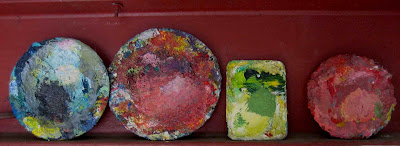palettes, abstraction, hatred
my palettes. 10" - 12"
oil paint on ceramic plates.
*****
yesterday i wrote about an exhibition that i am participating in called "palettes d'artiste" (artists palettes). in my text i remarked that some of the palettes are paintings in their own right. my own comment made me wonder, made me reflect about something...why is it that some people can more easily appreciate abstraction if it also has an alternate life, a life of practicality, a life with a purpose?
once upon a time, several years ago, i was in the national gallery in ottawa, ontario. i was walking, floating, spacing out in the grand room devoted to american abstract expressionism and color-field painting. the room, and the entire gallery, is designed by canadian architect moishe safdie and it is a monument to light and space, an elegant and earnest structure full of fine art treasures.
this particular room has several gorgeous, monumental works in it...most notably an abstract painting on glass by jackson pollock that was used in a film by hans namuth to illustrate pollock's painting technique and a large mark rothko painting - #16...a simple, subtle, profound painting of delicate and subtle layers of reds and whites. i was seriously involved with the rothko and the pollock when a couple wandered into the room. they were appalled, fortissimo with their opinions about the paintings. they were outraged, insulted, really pissed off. i was stunned but fascinated by their display of indignation, made all the more compelling to me by the fact that the man was wearing a striped shirt and the woman was wearing a dress with an abstract pattern. i wondered why they couldn't appreciate the paintings even just a little, why did they become so aggressive and dismissive of the paintings when their very own clothing had elements of abstraction, elements that they had obviously reflected upon and carefully considered before choosing to wear them? my feeling was that the practical purpose of clothing provided for them a window or doorway into a non-threatening space that allowed the simple aesthetics of abstraction - color, line, shape - to be acknowledged, appreciated, respected. why is it when abstraction does not have a practical, utilitarian purpose it incites irritability, arouses hostility, makes some people question the honesty of artists, makes them want to shut down the gallery...why does abstraction elicit, trigger and invoke statements of hatred...statements like, "goddamn artist, get a real job."
oil paint on ceramic plates.
*****
yesterday i wrote about an exhibition that i am participating in called "palettes d'artiste" (artists palettes). in my text i remarked that some of the palettes are paintings in their own right. my own comment made me wonder, made me reflect about something...why is it that some people can more easily appreciate abstraction if it also has an alternate life, a life of practicality, a life with a purpose?
once upon a time, several years ago, i was in the national gallery in ottawa, ontario. i was walking, floating, spacing out in the grand room devoted to american abstract expressionism and color-field painting. the room, and the entire gallery, is designed by canadian architect moishe safdie and it is a monument to light and space, an elegant and earnest structure full of fine art treasures.
this particular room has several gorgeous, monumental works in it...most notably an abstract painting on glass by jackson pollock that was used in a film by hans namuth to illustrate pollock's painting technique and a large mark rothko painting - #16...a simple, subtle, profound painting of delicate and subtle layers of reds and whites. i was seriously involved with the rothko and the pollock when a couple wandered into the room. they were appalled, fortissimo with their opinions about the paintings. they were outraged, insulted, really pissed off. i was stunned but fascinated by their display of indignation, made all the more compelling to me by the fact that the man was wearing a striped shirt and the woman was wearing a dress with an abstract pattern. i wondered why they couldn't appreciate the paintings even just a little, why did they become so aggressive and dismissive of the paintings when their very own clothing had elements of abstraction, elements that they had obviously reflected upon and carefully considered before choosing to wear them? my feeling was that the practical purpose of clothing provided for them a window or doorway into a non-threatening space that allowed the simple aesthetics of abstraction - color, line, shape - to be acknowledged, appreciated, respected. why is it when abstraction does not have a practical, utilitarian purpose it incites irritability, arouses hostility, makes some people question the honesty of artists, makes them want to shut down the gallery...why does abstraction elicit, trigger and invoke statements of hatred...statements like, "goddamn artist, get a real job."



Comments